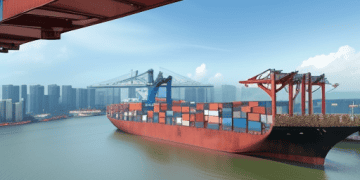Singapore may experience limited near-term benefits from the latest round of U.S. tariffs introduced by President Donald Trump, though economists and policymakers warn that broader economic risks could soon overshadow any initial relief.
The new trade measures, aimed at tightening loopholes and increasing tariffs on imports from countries such as Vietnam, have led to an unexpected side effect: an oversupply of goods in global markets. As suppliers adjust to reduced demand from the U.S., surplus products are being redirected to other regions — including Singapore — at lower prices.
According to Tamara Mast Henderson, ASEAN economist at Bloomberg Economics, this could result in temporarily cheaper inputs for Singapore’s manufacturing and processing sectors. “Everyone outside the U.S. will have these lower-priced goods,” Henderson said. “We might actually do well in Singapore… until that becomes a problem.” She noted that the U.S. may eventually address these supply chain gaps, as seen in the move to equalize tariffs on Vietnam with those on China.
Currently, Singapore faces a baseline 10% tariff from the U.S., the lowest among its Southeast Asian peers. While this could provide short-term advantages, the city-state’s role as a major global hub for semiconductors, pharmaceuticals, and electronics places it at risk if global trade tensions escalate further.
Deputy Prime Minister Gan Kim Yong stated that the situation is more severe than previously expected. The government may need to revise its GDP growth forecast for 2025, currently projected at 1% to 3%. Nomura has already lowered its growth estimate for Singapore to 2.3% from 2.8%, one of the steepest downward revisions in Asia. United Overseas Bank also warned that Singapore is particularly exposed to an external trade-driven slowdown.
As Prime Minister Lawrence Wong approaches the one-year mark of his tenure, economic challenges are becoming more pronounced, especially with a general election on the horizon and continued public concern over inflation and the cost of living.
Singapore has so far refrained from retaliatory measures. Instead, officials are pursuing diplomatic channels. Foreign Minister Vivian Balakrishnan described the new tariffs as a “major setback to eighty years of global economic integration” and a “profound turning point” for international trade relations.
Explore the newest supply chain news at The Supply Chain Report. Visit ADAMftd.com for free international trade tools.
#SingaporeTrade #USTariffs #GlobalMarkets #TradeTensions #ExportEconomy #ShortTermGains #EconomicRisks















